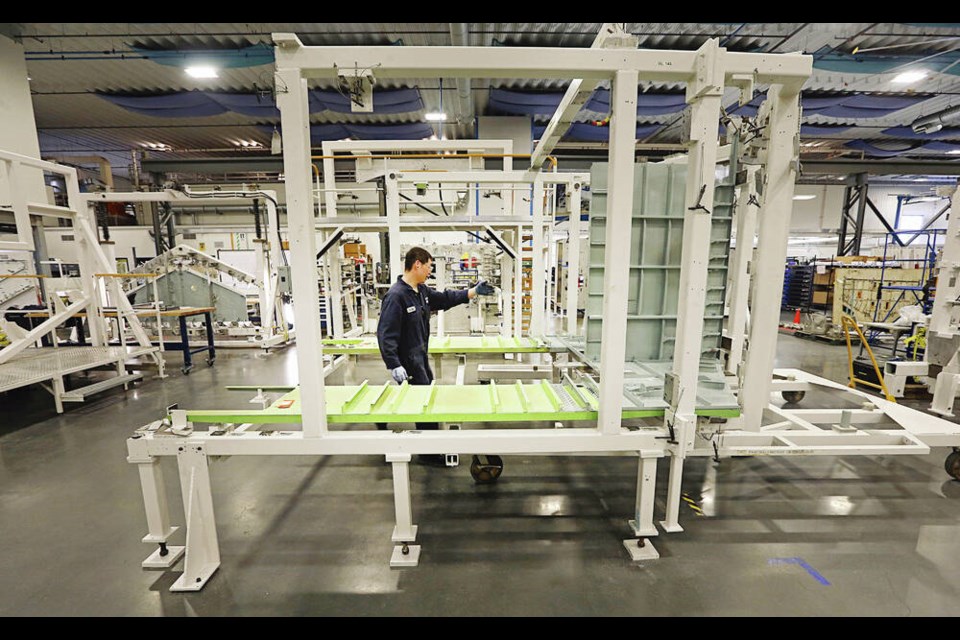A manufacturing plant in North Saanich will be busy building parts for Europe’s next generation of firefighting planes until the next decade.
Neil Sweeney, De Havilland Canada’s vice-president for corporate affairs, said the company’s North Saanich operation is expanding after the company committed to building the next-generation DHC-515 firefighting aircraft. “We’re certainly ramping up now as we get more orders in the books.”
The local employee count doubled to about 300 in recent months, he said.
Part of that rapid expansion has been enabled by an in-house training academy, he said. “If you don’t have aerospace experience but you’re technically minded, we’ll provide the training to get you onto the floor relatively quickly.”
The twin-engine DHC-515 Firefighter, an updated version of the Canadair amphibious firefighting aircraft, can dump about 6,000 litres of water in a single run and refill its tanks in 12 seconds.
New and current customers are reaching out “given the changing climate and the need to refresh the fleet,” Sweeney said.
The company is in talks with several provinces about orders, he said.
Canadair CL firefighting planes have formed the backbone of European and North American aerial firefighting fleets for decades.
About 225 of those planes have been made since the 1960s, but production has been paused since 2015.
De Havilland, which purchased the program from Bombardier in 2016, restarted the line when European customers committed to ordering 22 DHC-515 aircraft in 2022.
The company has at least 24 firm and probable orders from Europe, half of them from the European Union.
The €600-million ($875 million Cdn) price tag for the European Union’s 12-plane order was revealed last week.
The planes purchased by the European Union will be based in Greece, Croatia, Spain, France, Italy and Portugal and deployed through EU’s civil protection RescEU program, which shares its assets to participating states in times of disaster.
Those six countries are ordering the other 12, with two nations already putting agreements in place.
Ursula von der Leyen, president of the European Commission, said she is looking forward to further co-operation with Canada when the purchase was announced during the EU-Canada summit in November.
“The climate emergency is all too real. We must partner to better address natural disasters,” von der Leyen said.
Davor Božinovic, Croatia’s deputy prime minister and minister of interior, signed a €105-million agreement for two DHC-515 aircraft on March 23, which is expected to increase Croatia’s firefighting aerial capabilities by a third.
Greece inked a €361-million deal for seven DHC-515 Firefighters last Monday. Two of those planes will go to the RescEU program, Reuters reported.
Government spokesperson Pavlos Marinakis said the planes will be delivered to Greece in batches from 2027 to 2030.
The country experienced massive fires last year that killed 20 people and decimated vast tracts of forest and farmland.
One fire in northeast Greece became the largest wildfire recorded in an EU country since records began in 2000.
Sweeney said De Havilland is trying to keep the DHC-515 supply manufacturing chain in-house and within Canada.
For example, the landing gear is from Héroux Devtek, a Quebec-based manufacturer, he said.
Other components include French-made propellers and engines from Pratt & Whitney Canada.
Sweeney said much of the in-house manufacturing, such as aerostructure parts, will be done at the De Havilland manufacturing facility in North Saanich, formerly Viking Air.
(De Havilland Canada and Viking Air, subsidiary companies of Longview Aviation Capital owned by Victoria billionaire Sherry Brydson, were consolidated into one brand entity in 2022.)
Final plane assembly will be done in Alberta’s Wheatland County, 30 minutes east of Calgary, where a 1,500-acre manufacturing facility is being built.
“We just don’t have the space in Victoria,” Sweeney said.
Janez Lenarčič, EU’s commissioner for crisis management, thanked the Canadian government for facilitating the Greek and Croatian agreements with De Havilland last Monday.
The Canadian Commercial Corporation, a Crown corporation that helps with international contracting and procurement, played a role in finalizing purchasing agreements.
— With files from The Associated Press
>>> To comment on this article, write a letter to the editor: [email protected]



